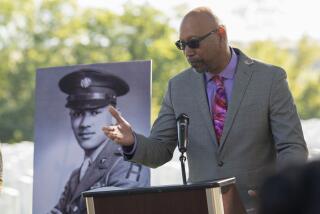A Hero’s Valor Rewarded at Last : Veteran: Air Force officials come to a Garden Grove nursing home to award the Distinguished Flying Cross to Jack Ward, now unable to speak and paralyzed.
- Share via
GARDEN GROVE — For nearly 46 years, Jack Ward’s bravery was recognized only by his family and the men whose lives he saved.
On Dec. 11, 1944, his pilot lay dead at his side as 1st Lt. Ward, the wounded co-pilot, completed a World War II mission over Austria. Despite slipping in and out of consciousness, Ward kept the damaged B-24 from crashing into a frigid lake near Vienna, giving himself and eight other crew members a chance to save themselves by bailing out.
Two of his fellow officers flying that mission later received the Distinguished Flying Cross.
Somehow Ward was overlooked.
But that changed Saturday, when when Air Force officials came to a Garden Grove nursing home where Ward now lives--unable to speak and paralyzed from a stroke--and pinned the blue-and-white-ribboned medal to the retired elementary school teacher’s chest.
Flanked by two Air Force officers, a congressional aide, former crew members and family and friends, Ward--now 69--solemnly accepted the prestigious medal that was nearly five decades overdue.
“He’s really overwhelmed,” said Beverly Ward, 68, her husband’s childhood sweetheart, who married him before he was shipped to Europe in 1944. “I’m overwhelmed as well.”
Ward later clenched a pointer between his teeth and spelled out, “Thanks for coming.”
The award ceremony at Hallmark Nursing Center in Garden Grove culminated Beverly Ward’s long battle with the military bureaucracy to have the medal presented to her husband, even though Ward himself was willing to let the matter drop.
“He wouldn’t have put any emphasis” on his bravery, she said as she stood next to her husband. “But I felt that this was not an honor that should be overlooked.”
Beverly Ward had heard the story countless times of how the crew was shot down. But it was not until she and a former crew mate talked about the incident in 1988 that the issue of the medal arose.
Paul Butler, a New York resident who was visiting the Wards, said he had assumed that his old friend had received a medal with the others, so he had never brought up the subject.
Butler’s visit started a campaign by Beverly Ward, a former WAVE, which included contacting a journalist from a Long Beach newspaper and Rep. Dana Rohrabacher (R-Long Beach).
The repeated rejections by the Air Force “did not stop Mrs. Ward,” Rohrabacher aide Mike Gureckas said. “This story is about bravery, and one of the morals of this story is her persistance in the face of adversity.”
Two weeks ago, the Air Force relented, but not until Beverly Ward and the surviving crew members painstakingly re-created a record of the incident. All official records of the crash were destroyed in a fire at the Army Records Center in St. Louis, Mo., nearly 20 years ago.
Butler, who was tail gunner that day, and Gilbert Fisher, 71, who was nose gunner, gave the following chronology:
The crew had just completed 20 successful missions from their base in Italy into enemy-held territory, when they were assigned to destroy a well-fortified oil refinery in the outskirts of Vienna, Butler said.
“(That) was a day of particular honor for us, but later (became) a turning point in our lives,” Butler wrote.
After completing a successful bombing run over the refinery, the plane was suddenly confronted with a battery of anti-aircraft guns that had been moved into place on flatbed rail cars.
“This was an important industrial target,” Butler said. “They (Germans) knew that was what we were after, and they were ready.”
The bright blue December sky above Vienna was suddenly blackened by exploding anti-aircraft shells that shook the plane violently and caused it to dip and moan. Without warning, the hypnotic drone of the four engines was drowned out by an explosion that engulfed the nose of the rattling bomber. A hailstorm of shell fragments flew into the cockpit.
One piece of hot metal pierced Ward’s left hand, almost severing it, and lodged in Campbell’s neck, killing him instantly. Ward also suffered deep wounds in his legs and other injuries that eventually cost him his spleen.
Despite much loss of blood, Ward kept crew members calm, telling them that he was determined to keep the plane in the sky long enough to reach safety behind advancing Soviet troops.
But the plane, which lost two of its four engines, continued to lose altitude, so the best Ward could do was to keep the plane from crash-landing in the lake. The crew members then bailed out and were later captured by the Germans.
“There was a good chance that we would not have made it over the lake,” Fisher said. “But he kept (the plane) up.”
Captured, Ward was taken to a makeshift hospital, where a captured Soviet doctor nursed him back to health.
“Jack saved us all,” Fisher said. “But the Russian saved him.”
Ward eventually was sent to Moosburg, Germany, where he was finally liberated by Gen. George S. Patton’s troops just before the end of the war.
Ward was never the same. Once a UCLA football player and physical education major, he came home 60% disabled.
In 1968, Ward underwent brain surgery for a condition, apparently not related to his war injuries, that was costing him his sight. That finally forced him into early retirement in 1977 after 18 years of teaching in the Los Angeles Unified School District, Beverly Ward said.
Five years later, he had a stroke that incapacitated him. Since then, he has stayed twice at a veterans hospital and with his family.
In March, he moved to the nursing home on Haster Street.
“He tolerated a lot of discomfort,” Beverly Ward said.
In fact, she said, “he’s been living on borrowed time for years.”


